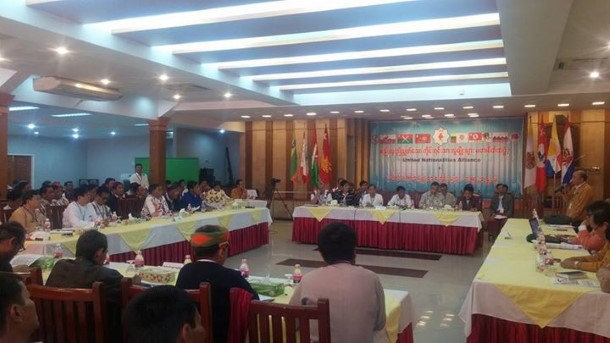RANGOON — The United Nationalities Alliance (UNA), an umbrella group of ethnic political parties, reiterated its long-standing call for tripartite political dialogue following a three-day meeting in Rangoon that ended on Wednesday.
“We want a nationwide peace agreement and political dialogue,” said Sai Nyunt Lwin, a senior leader with the Shan Nationalities League for Democracy and a member of the UNA. “Our stand is to have a tripartite political dialogue.”
Sai Nyunt Lwin said the UNA did not accept the Burma Army as a single negotiating group in the three-way political dialogue, which would include the ethnic armed groups and political parties, the National League for Democracy (NLD) and the Burmese government.
“The army and the government have one command. They are one organization,” Sai Nyunt Lwin said. “The army should not be seen as one [negotiating] group. We do not accept this. On our side, our ethnic political parties and ethnic armed groups will be a single group.”
Aye Thar Aung, leader of the Arakan National Party, said the UNA would not accept four- or six-party talks.
“Tripartite political dialogue is the best option for our country to solve our political conflicts,” Aye Thar Aung said. “We have three political forces in our country. If all three groups sit together, we could resolve our political issues.”
Following the UNA meeting, held on Dec. 22-24 in Rangoon, the group issued a nine-point statement calling on the government to hold political dialogue, work toward a federal system of governance and afford equal rights to ethnic nationalities.
About 200 representatives from ethnic political parties, civil society and ethnic armed groups joined the meeting. Representatives from the Shan State Army-South, the New Mon State Party, the Karen National Union, the Karenni National Progressive Party, the Kayan New Land Party and the All Burma Students’ Democratic Front were present as observers.
The UNA is an umbrella group of eight ethnic political parties that was formed following the 1990 elections, when the ruling junta refused to cede power to the NLD. Originally it was comprised of 12 different political parties.
UNA members refused to participate in the 2010 national elections as they opposed the military-drafted 2008 Constitution. However, some UNA leaders have indicated that they intend to participate in national elections slated for late 2015.
Min Soe Lin, a senior leader with the Mon Democracy Party, told The Irrawaddy that his party had already decided to participate in next year’s elections as the party had determined that they could criticize, and possibly amend, the Constitution from within Parliament.
“We know this government is buying time before [instituting genuine] democracy,” Min Soe Lin said. “They are afraid of change because they are worried about their rights abuses in the past, and that the people will take revenge if the country has a fully democratic system.”
Aye Thar Aung also expressed reservations over the current government’s reform process.
“I have doubts about their reforms because now more conflicts have broken out. They should bring ethnic leaders, who could help solve these conflicts, to the table,” Aye Thar Aung said.

















